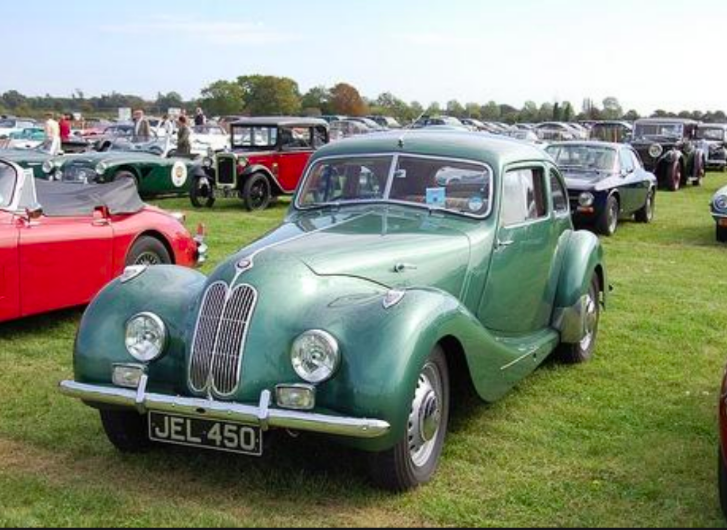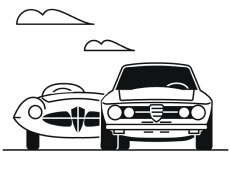-
Insurance
InsuranceAbout our productsLearn about insuringGet a quote Get current values, historical values, model history and more.
-
Valuation
ValuationHagerty valuation toolLook up a vehicle value Get current values, historical values, model history and more.
-
Events
EventsHagerty official eventsHagerty ClubhouseEvent calendar
-
Entertainment
EntertainmentMore to explore
- Portal login
1949 Bristol 400
Base 2dr Saloon 2 L
Vehicle values by condition
Fair
Condition 4
£25,100
#4 cars are daily drivers, with flaws visible to the naked eye. The chrome might have pitting or scratches, the windshield might be chipped.
Good
Condition 3
£44,700
#3 cars could possess some, but not all of the issues of a #4 car, but they will be balanced by other factors such as a fresh paint job or a new, correct interior.
Excellent
Condition 2
£71,500
#2 cars could win a local or regional show. They can be former #1 cars that have been driven or have aged. Seasoned observers will have to look closely for flaws.
Concours
Condition 1
£96,800
#1 vehicles are the best in the world. The visual image is of the best car, unmodified, in the right colours, driving onto the lawn at the finest concours.
Insurance premium for a
1949 Bristol 400 Base 2dr Saloon 1971
valued at £44,700
£226.95
/ year*
History of the 1947 - 1950 Bristol 400

1947 - 1950 Bristol 400
The Bristol 400 was a four-seater coupe produced between 1947 and 1950.
The first ever motor car made by the Bristol Aeroplane Company had framework derived from the BMW 326, a body with strong overtones of the BMW 327/80 and a 2-litre OHV S6 engine based on the BMW 328's power plant. The 400 featured Lockheed hydraulic braking, rack-and-pinion steering, front independent suspension via single upper wishbones and lower transverse leaf springs, and a live axle at the rear.
In 1941 Bristol was considering embarking on small-scale car manufacture and in 1945 they acquired Frazer Nash who, before WW2, imported BMWs into the UK. Later that year the War Reparations Board assisted Frazer Nash in obtaining the rights to build BMWs and the 400 was announced in September 1946 with a formal launch at the Geneva Motor Show in March 1947.
At a price of £2,373 14s 6d, the new Bristol was an almost unattainable dream to motorists in Atlee-era Britain, but the 400 was one of the finest touring cars in the world. The company's aeronautical heritage was brought to bear on the coachwork made from steel with an aluminium boot, bonnet and door panels. The framework was steel-clad timber mounted to the 'A' frame. Top speed was 95 mph and 0-60 in 19 secs and the 400's equipment included 'a built in radio' and adjustment for the steering column and front seat backrests. A typically thoughtful touch was the opening rear screen that augmented the sliding windows in the front doors.
In January 1947 Frazer Nash was sold, at which point the Bristol Car Company became an independent company, and two years later the 400 achieved a class victory in the Monte Carlo Rally. Production ceased in 1950 when it was superseded by the 401.
The 400 was made as a 2-door coupe - a cabriolet was initially listed but Bristol decided not to enter it into production.
The Bristol 400's engine was a 1,971 cc unit, which differed from the BMW 328 plant in its use of better, aeronautical-proven materials; the base Type 85 unit was single carb and the more popular Type 85A motor boasted triple carbs. There was also the '85B' with 90 bhp and 'sports camshaft', while the '85C' had a 'touring camshaft' and three Solex 32B1 carbs. On all versions, the transmission was a 4-speed gearbox with a freewheel on first gear and synchromesh on the top three ratios.
To quote The Autocar of 9th January 1948, the 400 is 'a real car, safe, swift and completely under control, whatever the circumstances'. By modern standards, the Bristol may feel heavy but the ride is superior to cars four decades its junior, the engine is splendidly responsive and the freewheel useful in heavy traffic.
A tired engine can cost a five-figure sum to rebuild so it does pay to investigate it closely and damaged leather trim can be almost as expensive to replace. The Bristol Owners' Club is an excellent source of wisdom regarding spare parts.
The 400 is the car that established the Bristol mystique – that merely 'good' or 'acceptable' would never be enough for the driver. Rivals to the 400 included the AC 2-Litre, the Healey Elliott and the Jaguar XK120.
Hagerty Newsletter
Get your weekly dose of car news from Hagerty UK in your inbox

ADVERTISEMENT